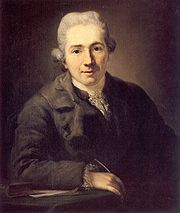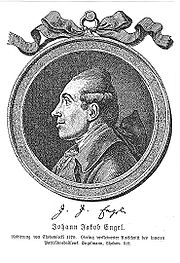
Johann Jakob Engel
Encyclopedia


Germany
Germany , officially the Federal Republic of Germany , is a federal parliamentary republic in Europe. The country consists of 16 states while the capital and largest city is Berlin. Germany covers an area of 357,021 km2 and has a largely temperate seasonal climate...
author
Author
An author is broadly defined as "the person who originates or gives existence to anything" and that authorship determines responsibility for what is created. Narrowly defined, an author is the originator of any written work.-Legal significance:...
.
Life
Engel studied theologyTheology
Theology is the systematic and rational study of religion and its influences and of the nature of religious truths, or the learned profession acquired by completing specialized training in religious studies, usually at a university or school of divinity or seminary.-Definition:Augustine of Hippo...
at Rostock
University of Rostock
The University of Rostock is the university of the city Rostock, in the German state of Mecklenburg-Vorpommern.Founded in 1419, it is the oldest and largest university in continental northern Europe and the Baltic Sea area...
and Bützow
Bützow
Bützow is a town in the district of Rostock in Mecklenburg-Western Pomerania in Germany, with a population of 8,122 .The town was first mentioned in 1171....
, and philosophy at Leipzig
University of Leipzig
The University of Leipzig , located in Leipzig in the Free State of Saxony, Germany, is one of the oldest universities in the world and the second-oldest university in Germany...
, where he took his doctors' degree. In 1776 he was appointed professor of moral philosophy and belles-lettres in the Joachimstal gymnasium at Berlin
Berlin
Berlin is the capital city of Germany and is one of the 16 states of Germany. With a population of 3.45 million people, Berlin is Germany's largest city. It is the second most populous city proper and the seventh most populous urban area in the European Union...
, and a few years later he became tutor to the crown prince of Prussia, afterwards Frederick William III.
The lessons which he gave his royal pupil in ethics
Ethics
Ethics, also known as moral philosophy, is a branch of philosophy that addresses questions about morality—that is, concepts such as good and evil, right and wrong, virtue and vice, justice and crime, etc.Major branches of ethics include:...
and politics
Politics
Politics is a process by which groups of people make collective decisions. The term is generally applied to the art or science of running governmental or state affairs, including behavior within civil governments, but also applies to institutions, fields, and special interest groups such as the...
were published in 1798 under the title Furstenspiegel, and are a favourable specimen of his powers as a popular philosophical writer. In 1787 he was admitted a member of the Academy of Sciences of Berlin, and in the same year he became director of the royal theatre, an office he resigned in 1794.
Works
Besides numerous dramas, some of which had a considerable success, Engel wrote several valuable books on aesthetic subjects. His Anfangsgrunde einer Theorie der Dichtungsarten (1783) showed fine taste and acute critical faculty if it lacked imagination and poetic insight. The same excellences and the same defects were apparent in his Ideen zu einer Mimik (1785), written in the form of letters.His most popular work was Der Philosoph für die Welt (1775), which consists chiefly of dialogues on men and morals, written from the utilitarian standpoint of the philosophy of the day. His last work, a romance entitled Herr Lorenz Stark (1795), achieved a great success, by virtue of the marked individuality of its characters and its appeal to middle-class sentiment.
Engel's Sämtliche Schriften (complete writings) were published in twelve volumes at Berlin in 1801-1806; a new edition appeared at Frankfort in 1851.

